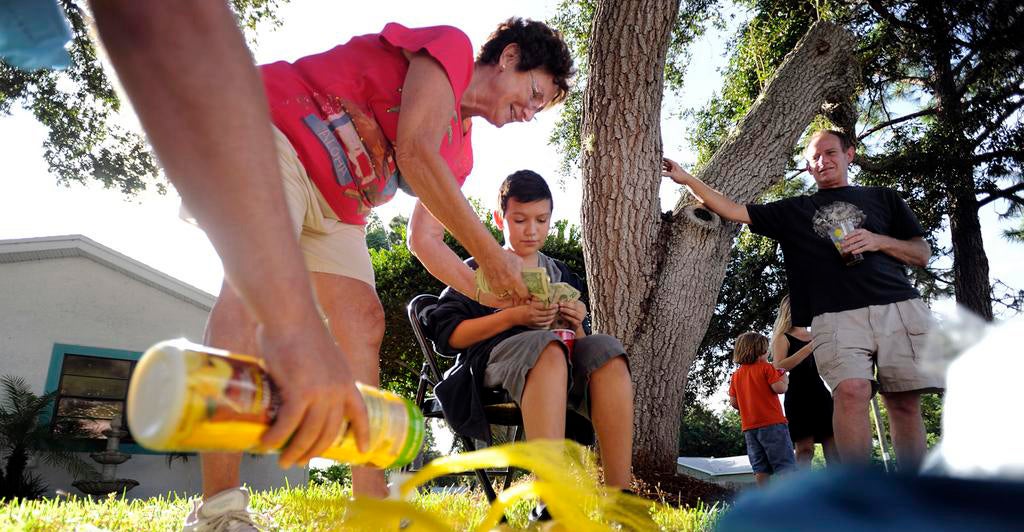On the corner of Patricia Avenue and San Salvador Drive in a Dunedin, Fla., neighborhood, 12-year-old T.J. Guerrero operates a lemonade stand to raise money for summer activities with his friends and family.
His stand is usually open in the afternoon, and customers line up to sample his lemonade and baked goods. “I tried the strawberry before and it’s perfect,” one customer commented, according to the Tampa Bay Times. “That’s what it’s about. He’s willing to work.”
Hard work and business skills are the lessons learned in this venture. “It’s all about profit,” T.J. noted. He operates his stand with a little white table and yellow sign on the corner of a grassy lawn. The neighbors enjoy seeing the business flourish in the summer months, reminding them of their childhood. “I had one when I was a little kid. We all did,” said Vincent Titara, who lives nearby T.J.’s lemonade stand. “I think it’s cute.”
But not everyone in the neighborhood was happy with the young boy’s little business.
Wilkey asserts that T.J.’s lemonade stand is an “illegal business” that causes excessive traffic and noise that could reduce his property values.
In a scenario reminiscent of the relationship between fictional characters Dennis the Menace and Mr. Wilson, an older neighbor became increasingly upset with the placement of T.J.’s lemonade stand near his house and tried to force the city government to shut down the boy’s business.
Doug Wilkey, a 61 year-old resident of this Florida neighborhood, emailed City Hall at least four times in two years and requested the police to intervene. Wilkey asserts that T.J.’s lemonade stand is an “illegal business” that causes excessive traffic and noise that could reduce his property values. “The city could possibly face repercussion in the event someone became ill from spoiled/contaminated food or drink sales,” Wilkey speculated in one email.
The Tampa Bay Times reported that in one email to City Hall, Wilkey vented his frustration and wrote this summer that the stand was back “AGAIN!!!!!!!!!!!!”
Despite the impassioned arguments by this disgruntled neighbor, cooler heads in the local government prevailed. The mayor of Dunedin, Dave Eggers, showed his support by visiting the stand himself and sampling T.J.’s lemonade. “I think it is a great show of entrepreneurship,” Eggers explained. “This 12-year-old is setting a great example. I don’t know what the other neighbor’s problem is, but I would like to talk to him to try to figure it out.”
All across America, busybodies in local government and police are clamping down on “dangerous” food and drink stands.
Dunedin planning and development director Greg Rice summed up the city’s response as simply applying common sense: “We’re not in the business of trying to regulate kids like that; nor do we want to do any code enforcement like that,” he said. “We are not out there trying to put lemonade stands out of business.”
In a strange bit of irony, the Tampa Bay Times discovered that Wilkey himself is running an unlicensed business operation from his home, and is skipping out on paying required taxes. Rice noted that, “[t]he irony is [Wilkey’s] not following the rules either, or doesn’t seem to be,” and could face fines up to $250 per day until he comes into compliance. What goes around comes around.
While T.J. will continue to operate his business without interference, other young entrepreneurs have not been as fortunate.
- In Illinois, health officials tried to shut down an 11-year-old girl’s cupcake business for failing to obtain a license. Chloe Stirling started a business in her kitchen called “Hey, Cupcake!” In addition to selling her goods to friends and neighbors, she donated many to charitable events, including a fundraiser for a student with cancer, and delivered cupcakes to residents in a senior home. Regardless of the benefit to the community, the Illinois health officials declared that Chloe lacked the necessary permit to operate and told her to close up shop.
- In Washington, D.C., three activists were arrested by the Capitol police for selling 10-cent cups of lemonade on the lawn of the Capitol building. For the crime of providing low cost refreshment to tourists in the middle of August heat, the activists were threatened with up to one year in jail.
- In Holland, Mich.,, a zoning official shut down a 13-year-old’s hotdog stand because he was supposedly competing with nearby restaurants. Nathan Duszynski had planned to sell hotdogs to raise money for his disabled parents—his mom has epilepsy and his dad has multiple sclerosis. Within ten minutes of opening his shop, a zoning official ordered him to cease from operating because he lacked a license.
All across America, busybodies in local government and police are clamping down on “dangerous” food and drink stands.
In contrast, the story of the Dunedin government’s response to T.J.’s lemonade stand is encouraging. It can be tempting for a local government official or police officer to respond to every complaint by shutting down a roadside business, or arresting someone to keep the peace. That easy route often ends with a citation, a mug shot or a jail cell. It takes courage for officials to exercise discretion by choosing not to intervene.
While there might be continued pressure from T.J.’s neighbor, Wilkey, to shut down the lemonade stand, the local government in Dunedin can be proud that they stood back and allowed a young entrepreneur to follow his dreams.
And we can all drink (lemonade) to that.
